SparkFun Grid-EYE Infrared Array Breakout - AMG8833 (Qwiic)
Get ready to be able to see like the Predator! The SparkFun Grid-EYE Infrared Array Breakout board is an 8x8 thermopile array, meaning you have a square array of 64 pixels capable of independent temperature detection. It’s like having a thermal camera, just in a lower resolution. To make it even easier to to get your low-resolution infrared image, all communication is enacted exclusively via I2C, utilizing our handy Qwiic system. However, we still have broken out 0.1"-spaced pins in case you prefer to use a breadboard.
The on-board AMG8833 Grid-EYE from Panasonic possesses an accuracy rate of ±2.5°C (±4.5°F) with a temperature range of 0°C to 80°C (32°F to 176°F). Additionally, this IR "camera" board can detect human body heat at about 7 meters or less (that's about 23 feet), and has a frame rate of 10 frames a second to one frame a second. It is important to point out that while this version of the Grid-EYE is the high performance type with a high gain, it is only 3.3V tolerant. IE: Don't try to operate it at 5V (you won't have a very good time).
Note: The I2C address of the AMG8833 is 0x69 and is jumper selectable to 0x68. A multiplexer/Mux is required to communicate to multiple AMG8833 sensors on a single bus. If you need to use more than one AMG8833 sensor consider using the Qwiic Mux Breakout.
The SparkFun Qwiic connect system is an ecosystem of I2C sensors, actuators, shields and cables that make prototyping faster and less prone to error. All Qwiic-enabled boards use a common 1mm pitch, 4-pin JST connector. This reduces the amount of required PCB space, and polarized connections mean you can’t hook it up wrong.
- Operating Voltage(Startup): 1.6V - 3.6V
- Operating Voltage(Timekeeping): 1.5V - 3.6V
- Current Consumption: 4.5 mA
- 8x8 Thermopile Array
- Temperature Range: 0°C to 80°C (32°F to 176°F)
- Accuracy Rate: ±2.5°C (±4.5°F)
- Human Detection Distance: 7m or less (22.966ft)
- I2C Address: 0x69 (open jumper, default) or 0x68 (closed jumper)
- 2x Qwiic Connection Ports
- Schematic
- Eagle Files
- Hookup Guide
- Datasheet (AMG8833)
- Arduino Library
- Qwiic Page
- GitHub Repos
SparkFun Grid-EYE Infrared Array Breakout - AMG8833 (Qwiic) Product Help and Resources
Qwiic GRID-Eye Infrared Array (AMG88xx) Hookup Guide
May 3, 2018
The Panasonic GRID-Eye (AMG88xx) 8x8 thermopile array serves as a functional low-resolution infrared camera. This means you have a square array of 64 pixels each capable of independent temperature detection. It’s like having thermal camera (or Predator’s vision), just in really low resolution.
Core Skill: Programming
If a board needs code or communicates somehow, you're going to need to know how to program or interface with it. The programming skill is all about communication and code.
Skill Level: Competent - The toolchain for programming is a bit more complex and will examples may not be explicitly provided for you. You will be required to have a fundamental knowledge of programming and be required to provide your own code. You may need to modify existing libraries or code to work with your specific hardware. Sensor and hardware interfaces will be SPI or I2C.
See all skill levels
Core Skill: Electrical Prototyping
If it requires power, you need to know how much, what all the pins do, and how to hook it up. You may need to reference datasheets, schematics, and know the ins and outs of electronics.
Skill Level: Rookie - You may be required to know a bit more about the component, such as orientation, or how to hook it up, in addition to power requirements. You will need to understand polarized components.
See all skill levels
Comments
Looking for answers to technical questions?
We welcome your comments and suggestions below. However, if you are looking for solutions to technical questions please see our Technical Assistance page.
Customer Reviews
5 out of 5
Based on 2 ratings:
easy to program and get working
Really great with Qwiic cable, I connected to arduino, you only need to have in mind that need something to detect distance to correct the error margin if you want to measure temperature with some precision.
examples are really great and help me really a lot for conversion values in celsius and farenheit values.
I think it is a good product.

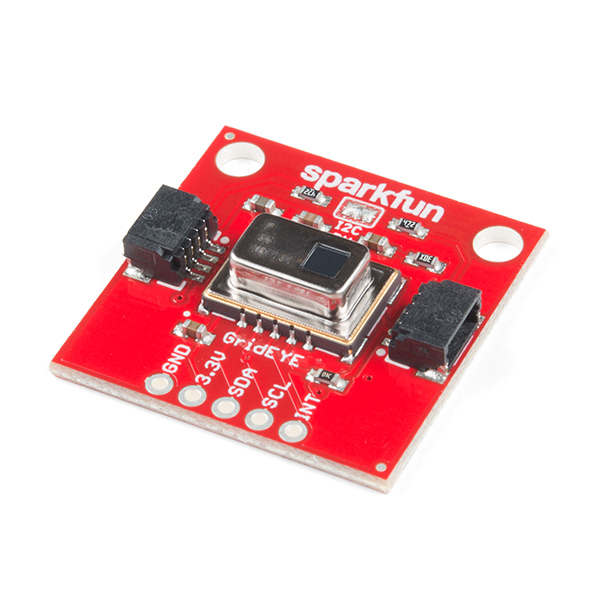
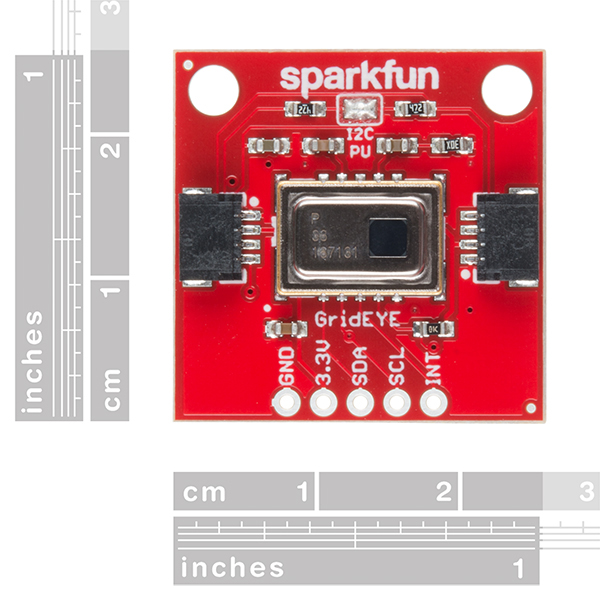
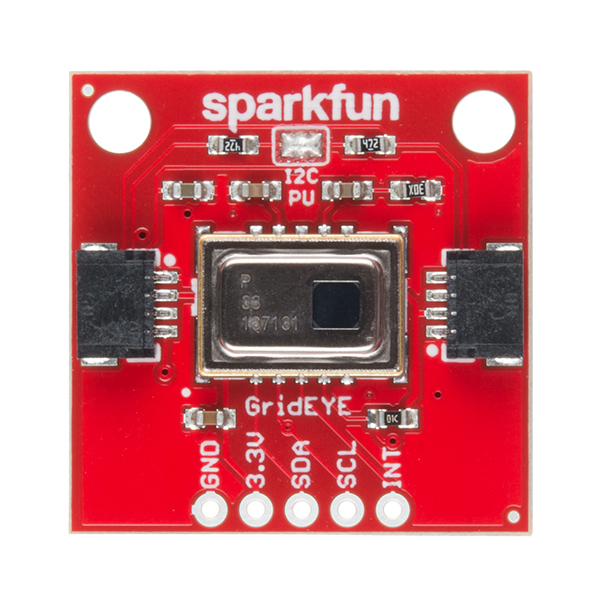
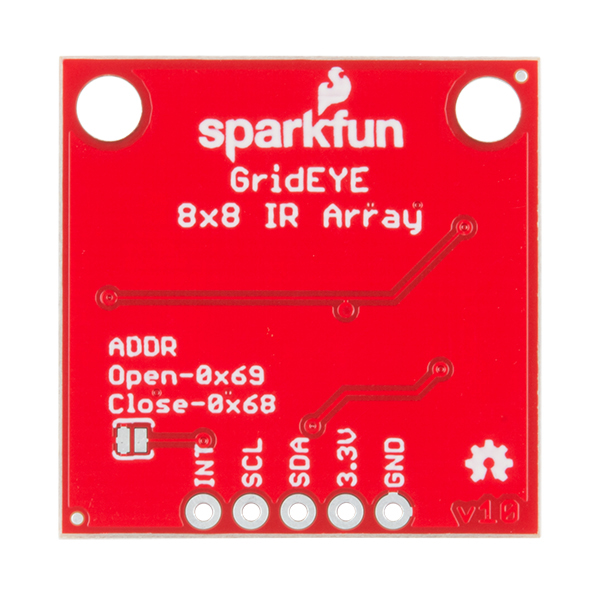
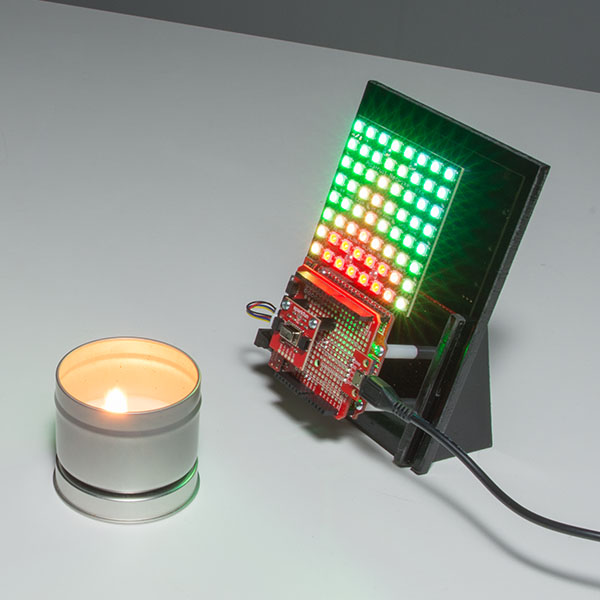
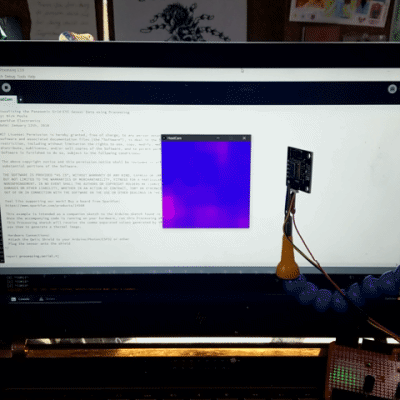
I worked with the Grideye pretty extensively a year ago and ended up moving to the much more expensive FLIR Lepton module. The Grideye is nice for the price point but suffers from a much higher effective noise level. Some of the noise is due to the underlying technology, but some has to do with the large "pixel" size. Each pixel covers about 7.5 angular degrees. This means that at 8 feet, each pixel is about 1 foot square. A heat source, such as a human head, will only cover part of that pixel. The reported pixel value includes the heat source as well as the surrounding cooler areas, yielding lower values much closer to the background level. It should work well for larger heat sources and at closer distances.
This is an amazing price for any thermal imager, but 8x8 seems constricting for a lot of applications. While something like the FLiR Lepton is beyond my budget (for now), I'd love to see a breakout board for this component. It appears to be a happy compromise in resolution and price point, though its a little difficult at the moment for a hobbyist such as myself to acquire. I'm sure a popular distributor like Sparkfun could get some ;D Thanks for reading my comment!